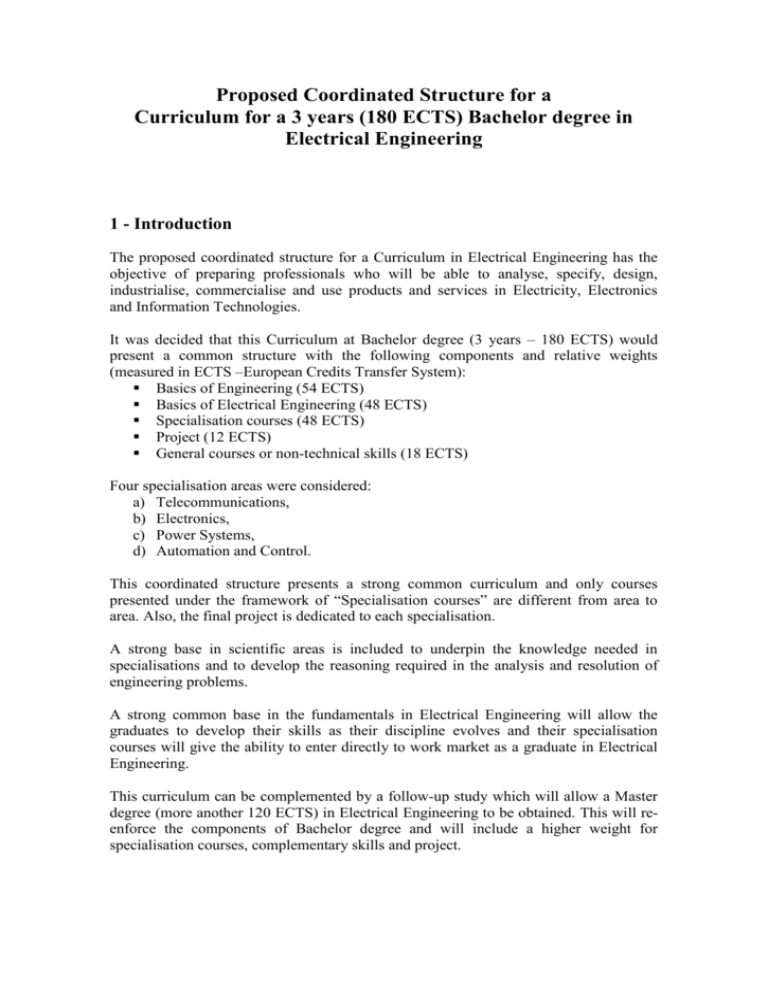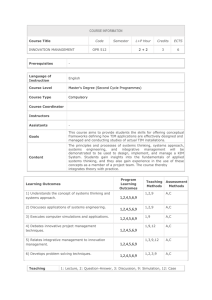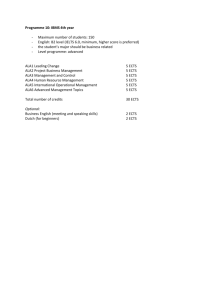Electrical Engineering
advertisement

Proposed Coordinated Structure for a Curriculum for a 3 years (180 ECTS) Bachelor degree in Electrical Engineering 1 - Introduction The proposed coordinated structure for a Curriculum in Electrical Engineering has the objective of preparing professionals who will be able to analyse, specify, design, industrialise, commercialise and use products and services in Electricity, Electronics and Information Technologies. It was decided that this Curriculum at Bachelor degree (3 years – 180 ECTS) would present a common structure with the following components and relative weights (measured in ECTS –European Credits Transfer System): Basics of Engineering (54 ECTS) Basics of Electrical Engineering (48 ECTS) Specialisation courses (48 ECTS) Project (12 ECTS) General courses or non-technical skills (18 ECTS) Four specialisation areas were considered: a) Telecommunications, b) Electronics, c) Power Systems, d) Automation and Control. This coordinated structure presents a strong common curriculum and only courses presented under the framework of “Specialisation courses” are different from area to area. Also, the final project is dedicated to each specialisation. A strong base in scientific areas is included to underpin the knowledge needed in specialisations and to develop the reasoning required in the analysis and resolution of engineering problems. A strong common base in the fundamentals in Electrical Engineering will allow the graduates to develop their skills as their discipline evolves and their specialisation courses will give the ability to enter directly to work market as a graduate in Electrical Engineering. This curriculum can be complemented by a follow-up study which will allow a Master degree (more another 120 ECTS) in Electrical Engineering to be obtained. This will reenforce the components of Bachelor degree and will include a higher weight for specialisation courses, complementary skills and project. 2 - Coordinated Structure Basics of Engineering (54 ECTS) * * * * Physics: mechanics, thermodynamics, optics, electromagnetism; Mathematics: Algebra, calculus, analysis Chemistry: material science, material properties, Programming language, Algorithms, Data structure 18 18 6 12 Basics of Electrical Engineering (48 ECTS) * Digital and analogue circuits: combinatorial, sequential, flip-flop, passive and active circuits, filters, amplifiers, signal generation 12 * Signal Theory and Control (Laplace transform, Fourrier transform, Z-transform, etc, discrete and continuous systems, control) 12 * Power systems: transformer, electrical machines, basis of power production, transmission, distribution, power devices 6 * Computer architecture, Hardware peripheral, laboratory 6 * Engineering Measurement, Data Acquisitions 6 * Wave propagation, transmission media 6 Specialisation courses, 48 ECTS 48 ECTS for courses are dedicated for each specialisation area. A list for each specialisation area is presented in section 3. Project on “name of the specialisation area” (12 ECTS) Project or training in laboratory or in company 12 General education, Non-Technical Skills (18 ECTS) * Foreign languages or free courses * Management, business, project management Others subjects referred: Communication skills: Report writing, presentation skills Business leadership and Project management Environmental issues and industrial laws Micro- and macroeconomics Scientific methodology 3 - Courses from each Specialisation Areas a) Telecommunications Specialisation Area (48 ECTS) Core Specialist Courses in Telecommunications (30 ECTS) * Advanced Analogue Electronics (filter design, PLLs, Mixers) * Information & Communication (Shannon theorem, concept of information, advanced modulation) * Digital Signal Processing * Networks (network configuration& architecture, routing) * Communications Systems (satellite systems, wireless systems) Specialist Option I – Computer Communications (18 ECTS) * Advanced programming (object oriented programming) * Networks (protocols, data transmission, computer networks) * Computer Systems (real-time systems, software engineering) Specialist Option II – Communication Systems (18 ECTS) * RF & Microwaves (wave propagation & antennas, waveguides. RF & microwave devices) Optical Communications (transmitters, receivers, optical fibres, WDM, Systems) * Communication Systems (circuits, components, sub-systems and system design) b) Electronics Specialisation Area (48 ECTS) Core Specialist Courses in Electronics (30 ECTS) * Digital and analogue circuits II: deepening, modelling, simulation * Components (physic of semiconductor, technology) * Microprocessors Elective in Electronics (18 ECTS): choice of 3 from(some examples): * Microwaves: propagation, antennas * Opto-electronics * Microelectronics * Sensors and actuators * Instrumentation (data acquisition, interfacing) * Power electronics: commands- choppers, inverters, energy * Analogue and digital communications * Network initiation c) Power System Specialisation Area (48 ECTS) Core Specialist Courses in Power Systems (30 ECTS) * Power Transmission and Distribution * Power Network Analysis * Electric Installations Project * Electrical Machines * Power Electronics Specialist Option I - Power Transmission and Distribution (18 ECTS) * Electric Energy Production * Power Network Dynamics * Protections and Switchgears Specialist Option II - Power Electronics and Electric Machines (18 ECTS) * Electric Drives * Power Electronics II * Industrial Automation Other courses referred: * Electric Energy Markets * Renewable Energies * Electrical Drives Control and Applications 12 12 6 * Electric Traction d) Automation and Control Specialisation Area (48 ECTS) Core Specialist Courses in Automation and Control (30 ECTS) * Advanced Control * Computer systems, single microcomputers * Modelling and system theory * Digital and analogue control systems * Programmable logic controllers * Sensors and actuators * Computer networks and communication Elective courses in Automation and Control Specialisation Area (18 ECTS), choice from elective courses (some examples): * Industrial Control * Instrumentation (interfacing, protocols, data acquisition) * Software design * Industrial database management * Process Visualisation * Computer vision * Basics of artificial intelligence * Scheduling and logistics





